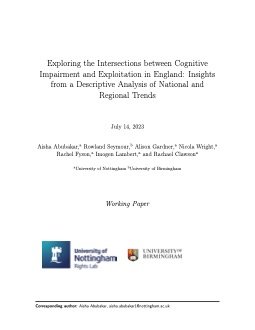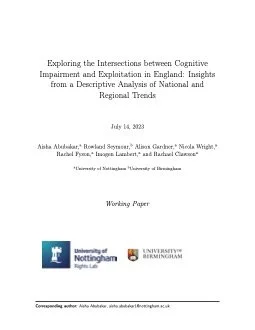By Aisha Abubakar, Rowland Seymour, Alison Gardner, Nicola Wright, Rachel Fyson, Imogen Lambert, and Rachael Clawsona
People with an illness, disability or other health conditions are more likely to experience various forms of exploitation in comparison to other groups, particularly if their health condition necessitates assistance with daily functioning such as personal care, financial management, or socialising. For the purpose of this study, we consider a wide range of cognitive impairments and differences that affect processing, understanding, and memory, and therefore may cause additional challenges in everyday life. People with ‘hidden’ disabilities such as mental health conditions, cognitive decline, intellectual disabilities, autism, and ADHD are more vulnerable to exploitation than people with other types of disability. For example, they may be vulnerable due to trauma from adverse experiences leading to dissociation, or addiction means they can be exploited to fulfil their needs. They may struggle to recognise when they are being exploited and may be unable to effectively communicate or report abuse. Adults with cognitive impairment living alone may be vulnerable, while those having difficulty understanding financial matters may be more vulnerable to financial exploitation. The aforementioned factors not only increase vulnerability to exploitation but also amplify the severity of harm when exploitation occurs, making the relationship between cognitive impairment and exploitation a complex and multidimensional phenomenon. Hence, implementing strategies that pay attention to these factors is imperative in preventing exploitation and mitigating the severity of harm. Yet, there is a lack of public and official statistics to quantify the intersections between exploitation and disability/cognitive impairment to inform appropriate strategies for mitigation. Adults with cognitive impairments may be classed as a vulnerable group of individuals at increased risk of being exploited because of their reduced capacity to identify and report abuse or exploitation. Hence the prevalence of exploitation in this population is
not well understood, it is thought to be under-reported due to the challenges faced by these individuals in communicating their experiences . Section 42 (S42) of the Care Act 2014 requires local authorities in England to conduct investigations when they have reasonable grounds to suspect that an adult with care and support needs is experiencing, or is at risk of experiencing, abuse, neglect, or exploitation. Social workers, health professionals, the police, and other relevant stakeholders are all involved in S42 investigations, with the aim of ensuring the safety and well-being of adults with care and support needs, as well as preventing and responding to incidences of maltreatment. Hence, these enquiries are intended to garner information about the adult and their circumstances, assess the risks to their safety, and determine the best way to protect them. Estimates from the Crime Survey for England and Wales (CSEW) show that between 2014 and 2020, people with cognitive impairment aged between 16 and 59 were more likely to be victims of different forms of domestic abuse and sexual assaults than people with other forms of impairment, particularly women. However, it is not possible to extrapolate what incidents reported by individuals with lived experience constitute exploitation in the CSEW. Hence this paper is an exploratory study aimed at quantitatively understanding the intersections between cognitive impairment and exploitation. Given that there is currently very little intersecting data, quantitative statements about how people with cognitive impairment are at risk of, or are being exploited, need to be extrapolated. To extrapolate the relationship between cognitive impairment and exploitation, this
study provides a descriptive account of disability prevalence, exploitation prevalence and S42 enquiries in English LAs using data from the Family Resources Survey (FRS), the National Referral Mechanism (NRM), and the Safeguarding Adults Collection (SAC), with the aim of addressing the following important questions: • Are there trends in disability prevalence and exploitation by types of impairment, and if so, what types of cognitive impairment and exploitation are more prominent? • Are there trends in S42 enquiries, and if so, what are they? • What proportion of S42 enquiries involved people with cognitive impairment? • How frequently did exploitation appear as a factor of S42 enquiries? The remainder of the paper is structured as follows. Section 2 explains what data is currently available to quantify the relationship between cognitive impairment and exploitation. The results and discussion in Section 3 then provides a contextual and descriptive account of the prevalence of disability and exploitation in England, including findings from the analysis of S42 enquiries. The final section offers concluding remarks, limitations, and emerging recommendations.
Working Paper 2023 50p.







